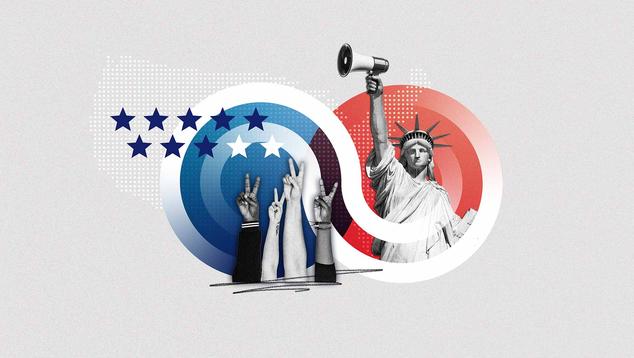Story Highlights
- Eight in 10 endorse compromise; 83% reject political violence
- 84% say U.S. benefits from having a mix of cultures
- Public split on whether cultural change is happening too fast
WASHINGTON, D.C. — Eight in 10 U.S. adults agree on a variety of issues that reflect core aspects of U.S. democracy. These include that using violence to achieve political goals is never OK; that elected leaders should compromise to get things done; and that having a mix of races, religions and cultures benefits the nation. Americans also express a desire to limit the political influence of wealthy individuals and businesses and believe there is a difference between facts and opinions.
These findings are the first from the Kettering Foundation/Gallup Democracy for All Project and are based on a multimodal (web and mail) survey of over 20,000 U.S. adults, conducted July 7 to Aug. 25. This is a five-year project designed to measure Americans’ views of how well democracy serves the U.S. and Americans from a variety of different backgrounds. The full report details how Americans largely agree that democracy is the best form of government but do not believe it is functioning well right now.
As part of the survey, Americans were shown five pairs of contrasting perspectives on how democracy and U.S. society should function and were asked to choose which perspective comes closer to their view. Large majorities of all key subgroups of Americans reject violence, favor compromise and embrace a multicultural society.
There are modest differences in some of these views by party, age and education. For example, Democrats, independents and college graduates are somewhat more likely than Republicans and non-college graduates to see multiculturalism as a strength. Older Americans and Democrats are more likely than younger Americans and Republicans to endorse compromise. Age differences are even more pronounced when it comes to rejecting the use of political violence, with senior citizens most opposed and young adults the least. This relationship will be explored in more depth in an article to be released next week.
Another question in the survey, asked on a five-point agree/disagree scale, finds that eight in 10 Americans strongly agree (39%) or agree (41%) that everyone, regardless of their views, has the right to free, nonviolent expression. Just 5% disagree, and 15% are neutral.
Americans Evenly Split on Pace of Cultural Change
While Americans embrace the idea of a multicultural society, there is a decided lack of consensus over the pace of cultural change. Forty-nine percent believe cultural changes in the U.S. over the past 25 years have happened too fast, while an equal share say those changes have occurred at a reasonable pace.
Close to two-thirds of Republicans (64%) think cultural changes have happened too fast, while the same proportion of Democrats hold the opposing view. But all other subgroups, including political independents and U.S. immigrants themselves, are more evenly divided on the question.
The 84% of Americans who view multiculturalism as a strength divide about evenly as to whether cultural change is happening too fast or at a reasonable pace. Overall, 45% of Americans view multiculturalism as a strength and are comfortable with the speed of change, while 39% see it as a strength but believe change is occurring too fast. More Democrats fall into the former group and more Republicans into the latter.
Responsibility for Meeting Basic Needs Also Divides Americans
Americans also divide about evenly when asked whether the government (48%) or people themselves (50%) should be responsible for making sure people’s basic needs are met. The divisions mainly reflect partisan differences, as 72% of Republicans say people should meet their own needs, while 69% of Democrats say the government is responsible for making sure individuals’ needs are met.
Younger and older adults also tend to disagree on this matter, with 63% of younger adults, those aged 18 to 29, seeing the government as responsible for meeting people’s basic needs, while just under 60% of those aged 50 and older say individuals are responsible.
Adults in lower-income households are more inclined than those with higher incomes to see the government as being responsible for meeting basic needs.
The age differences on this question are seen in all party groups. Younger Democrats, independents and Republicans are more likely than their older counterparts to believe the government should make sure people’s basic needs are met.
Two other items asked on a five-point agree/disagree scale also show close divisions between agreement, disagreement and a neutral position. These include whether people holding radical views should be prevented from running for office (33% agree, 27% neutral, 38% disagree) and whether laws should be created based on what is best for the majority of people, even if it negatively impacts minority groups (37% agree, 31% neutral, 32% disagree).
Bottom Line
The Kettering Foundation/Gallup Democracy for All Project’s inaugural survey reveals a strong foundation of shared democratic values among Americans at a time when many see the nation as starkly divided. There is broad support for the democratic ideals of nonviolence, compromise, multiculturalism and freedom of expression — key principles that underpin free, democratic and civil societies.
Yet, the data also reveal discord over how democracy should function, including how much power the majority should have, tolerance of radical voices in politics and the pace of cultural change. People’s political orientation, age, education and, in some cases, income are associated with deep societal divides over how to become a better union.
Stay up to date with the latest insights by following @Gallup on X and on Instagram.
Learn more about how the Gallup Panel works.




